HAT203 Hospitality Management: Analyzing Issues in Four Contexts
VerifiedAdded on 2023/06/10
|4
|1224
|495
Report
AI Summary
This report identifies and analyzes two critical issues in tourism and hospitality management: employee turnover and customer retention. The analysis is structured around four key contexts: operational, human resources, financial, and product & market. In the operational context, the report highlights the challenges of maintaining a 24-hour staff and the costs associated with employee turnover and customer loss. From a human resource perspective, the report emphasizes the importance of retaining efficient employees and ensuring a strong customer base. The financial context discusses the financial implications of employee turnover and the costs associated with customer maintenance. Lastly, the product and market context underscores the importance of effective human resources, customer satisfaction, and loyalty in capturing the market. The report concludes by highlighting the importance of addressing these issues to ensure the long-term survival and growth of hospitality businesses.

Hospitality Management 1
Hospitality Management
Hospitality Management
Paraphrase This Document
Need a fresh take? Get an instant paraphrase of this document with our AI Paraphraser

Hospitality Management 2
Introduction:
The two critical issues in context of tourism & hospitality management are the employee
turnover and maintenance of the valued customers. Both the issues are described in four different
contexts (Nazarian, Atkinson & Foroudi, 2017):
Operational Context:
The first and most important issue in terms of the hospitality management is the employee
turnover, as this industry serves 24 hours which means this business required staff for 24 hours
also. It is very difficult for the organizations to search for the long-term employees who are
ready to work for so much long hours. In case business fails to manage this issue properly, then it
will definitely affect the labour costs associated with employee turnover and impose negative
effect on the hotel business. Money spent by organization on employees go into waste, and this
will ultimately increase the operation cost of the organization.
Another issue faced by organization is the maintenance of the valued customers, as valued
customers are considered as the essence of the business. In case business fails to maintain the
valued customers then there is not only the loss of the profitability but also of the reputation of
the organization, and this cause threat to the long term survival of the organization. Loss of
valued customers also increases the operations cost of the organization as customers need to
spend more on advertisements and retaining the customers (Fung, King, Sparks & Wang, 2013).
Human Resource context:
Employees are considered as the most important resources of the organization, as it is not
possible to conduct the operations of the business without the effective human capital. In context
of the tourism and hospitality management, issue related to the employee turnover stress out the
human resource department also. As it becomes difficult for the organization to retain effective
and efficient employees in the organization and lack of effective human resource capital
definitely fall down the services provided by the organization and this will affect the human
resource efficiency of the organization (Sintes & Mattsson, 2009).
On the other hand, issue related to the maintenance of the valued customers directly relates with
the efficiency of the human resource capital in the organization. In case human resource of the
capital of the organization is not effective then it is not possible for the organization to ensure the
strong customer base of the valued customers in the organization. Therefore, it is necessary for
the organization to ensure the efficient human resource capital in the organization, as effective
human resource capital strengthen the service providing capacity of the organization and this will
ultimately leads to the strong base of valued customers in the organization (Martinez & Bosque,
2013).
Financial Context:
Another important area of the hospitality management is the financial context, and this issue
related to the employee turnover is the important issue in context of the finance. Employee
Introduction:
The two critical issues in context of tourism & hospitality management are the employee
turnover and maintenance of the valued customers. Both the issues are described in four different
contexts (Nazarian, Atkinson & Foroudi, 2017):
Operational Context:
The first and most important issue in terms of the hospitality management is the employee
turnover, as this industry serves 24 hours which means this business required staff for 24 hours
also. It is very difficult for the organizations to search for the long-term employees who are
ready to work for so much long hours. In case business fails to manage this issue properly, then it
will definitely affect the labour costs associated with employee turnover and impose negative
effect on the hotel business. Money spent by organization on employees go into waste, and this
will ultimately increase the operation cost of the organization.
Another issue faced by organization is the maintenance of the valued customers, as valued
customers are considered as the essence of the business. In case business fails to maintain the
valued customers then there is not only the loss of the profitability but also of the reputation of
the organization, and this cause threat to the long term survival of the organization. Loss of
valued customers also increases the operations cost of the organization as customers need to
spend more on advertisements and retaining the customers (Fung, King, Sparks & Wang, 2013).
Human Resource context:
Employees are considered as the most important resources of the organization, as it is not
possible to conduct the operations of the business without the effective human capital. In context
of the tourism and hospitality management, issue related to the employee turnover stress out the
human resource department also. As it becomes difficult for the organization to retain effective
and efficient employees in the organization and lack of effective human resource capital
definitely fall down the services provided by the organization and this will affect the human
resource efficiency of the organization (Sintes & Mattsson, 2009).
On the other hand, issue related to the maintenance of the valued customers directly relates with
the efficiency of the human resource capital in the organization. In case human resource of the
capital of the organization is not effective then it is not possible for the organization to ensure the
strong customer base of the valued customers in the organization. Therefore, it is necessary for
the organization to ensure the efficient human resource capital in the organization, as effective
human resource capital strengthen the service providing capacity of the organization and this will
ultimately leads to the strong base of valued customers in the organization (Martinez & Bosque,
2013).
Financial Context:
Another important area of the hospitality management is the financial context, and this issue
related to the employee turnover is the important issue in context of the finance. Employee

Hospitality Management 3
turnover directly affects the financial aspects of the organization, as any loss of employees waste
the cost spend by the organization on advertising for position, training for position, etc. and also
the additional cost spend by the organization for conduct the hiring of employees again for the
similar position. Any effect on the financial aspect ultimately reduces the profitability of the
organization and leads it towards the loss (Martinez & Bosque, 2013).
On the other hand, maintenance of the valued customers also affects the financial stability of the
organization. Maintenance of the customer base is the expensive action, and it includes lot of
costs. Anny loss of the valued customers can result in huge loss to the organization and directly
affects the financial stability of the organization. Unstable financial position of the organization
not only affects the growth of the organization but also gives opportunity to the competitors to
demean the organization. Therefore, for ensuring the financial stability of the organization also,
it is necessary for the business organization to maintain valued customers (Cantallops & Salvi,
2014).
Products and Market context:
Market is the place in which organization offered its services and products to the customers, and
also ensures that they capture large portion in the market for the purpose of ensuring the long
term survival. Effective human resources in the organization facilitate the competitive advantage
to the organization over its competitors, and competitive advantage over the competitors ensures
growth and profitability for the company in the long run. Effective employees force provides
best services to the customers and this ensures strong capturing of the market.
On the other hand, valued customers can only be maintained if organization provides best
services. Customer satisfaction is the source which attracts the customers automatically towards
the organization. Product and services are the only way through which customer can be satisfied,
and this also helps the organization in capturing the market. Market can only be captured with
the help of the customer loyalty, and for gaining the customer loyalty organization must focus on
the effective market and products. Therefore, for maintaining the valued customers and gaining
their loyalty, organization must focus on market and product effectiveness (Prajogo &
McDermott, 2011).
Conclusion:
Above stated facts clearly highlights the adequate understanding of the issues faced by the
tourism and hospitality approach, and this paper discuss both the issues in different contexts that
are operational, financial, human resource, and product and market.
turnover directly affects the financial aspects of the organization, as any loss of employees waste
the cost spend by the organization on advertising for position, training for position, etc. and also
the additional cost spend by the organization for conduct the hiring of employees again for the
similar position. Any effect on the financial aspect ultimately reduces the profitability of the
organization and leads it towards the loss (Martinez & Bosque, 2013).
On the other hand, maintenance of the valued customers also affects the financial stability of the
organization. Maintenance of the customer base is the expensive action, and it includes lot of
costs. Anny loss of the valued customers can result in huge loss to the organization and directly
affects the financial stability of the organization. Unstable financial position of the organization
not only affects the growth of the organization but also gives opportunity to the competitors to
demean the organization. Therefore, for ensuring the financial stability of the organization also,
it is necessary for the business organization to maintain valued customers (Cantallops & Salvi,
2014).
Products and Market context:
Market is the place in which organization offered its services and products to the customers, and
also ensures that they capture large portion in the market for the purpose of ensuring the long
term survival. Effective human resources in the organization facilitate the competitive advantage
to the organization over its competitors, and competitive advantage over the competitors ensures
growth and profitability for the company in the long run. Effective employees force provides
best services to the customers and this ensures strong capturing of the market.
On the other hand, valued customers can only be maintained if organization provides best
services. Customer satisfaction is the source which attracts the customers automatically towards
the organization. Product and services are the only way through which customer can be satisfied,
and this also helps the organization in capturing the market. Market can only be captured with
the help of the customer loyalty, and for gaining the customer loyalty organization must focus on
the effective market and products. Therefore, for maintaining the valued customers and gaining
their loyalty, organization must focus on market and product effectiveness (Prajogo &
McDermott, 2011).
Conclusion:
Above stated facts clearly highlights the adequate understanding of the issues faced by the
tourism and hospitality approach, and this paper discuss both the issues in different contexts that
are operational, financial, human resource, and product and market.
⊘ This is a preview!⊘
Do you want full access?
Subscribe today to unlock all pages.

Trusted by 1+ million students worldwide

Hospitality Management 4
References:
Cantallops, A. & Salvi, F. (2014). New consumer behavior: A review of research on eWOM and
hotels. International Journal of hospitality management, Volume 36, PP 41-51.
Fung, K. King, C. Sparks, B. Wang, Y. (2013). The influence of customer brand identification on
hotel brand evaluation and loyalty development. International Journal of hospitality
management, Volume 34(1), PP 31-41.
Martinez, P. & Bosque, I. (2013). CSR and customer loyalty: The roles of trust, customer
identification with the company and satisfaction. International Journal of hospitality
management, Volume 35, PP 89-99.
Nazarian, A. Atkinson, P. & Foroudi, P. (2017). Influence of national culture and balanced
organizational culture on the hotel industry’s performance. International Journal of hospitality
management, Volume 63, PP 22-32.
Prajogo, D. & McDermott, C. (2011). The relationship between multidimensional organizational
culture and performance. International Journal of Operations & Production Management, Vol.
31 Issue: 7, pp.712-735.
Sintes, F. & Mattsson, J. (2009). Innovation behaviour in the hotel industry. International
judgement of Tourism management, Volume 37(2), PP 380-394.
References:
Cantallops, A. & Salvi, F. (2014). New consumer behavior: A review of research on eWOM and
hotels. International Journal of hospitality management, Volume 36, PP 41-51.
Fung, K. King, C. Sparks, B. Wang, Y. (2013). The influence of customer brand identification on
hotel brand evaluation and loyalty development. International Journal of hospitality
management, Volume 34(1), PP 31-41.
Martinez, P. & Bosque, I. (2013). CSR and customer loyalty: The roles of trust, customer
identification with the company and satisfaction. International Journal of hospitality
management, Volume 35, PP 89-99.
Nazarian, A. Atkinson, P. & Foroudi, P. (2017). Influence of national culture and balanced
organizational culture on the hotel industry’s performance. International Journal of hospitality
management, Volume 63, PP 22-32.
Prajogo, D. & McDermott, C. (2011). The relationship between multidimensional organizational
culture and performance. International Journal of Operations & Production Management, Vol.
31 Issue: 7, pp.712-735.
Sintes, F. & Mattsson, J. (2009). Innovation behaviour in the hotel industry. International
judgement of Tourism management, Volume 37(2), PP 380-394.
1 out of 4
Related Documents
Your All-in-One AI-Powered Toolkit for Academic Success.
+13062052269
info@desklib.com
Available 24*7 on WhatsApp / Email
![[object Object]](/_next/static/media/star-bottom.7253800d.svg)
Unlock your academic potential
Copyright © 2020–2026 A2Z Services. All Rights Reserved. Developed and managed by ZUCOL.





